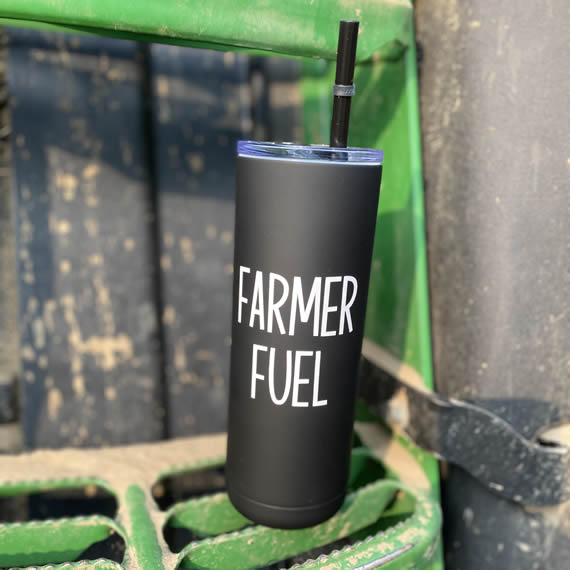Farm Safety: Everyone’s Responsibility
This blog entry contains material that could be of a sensitive nature including child loss, grief and a farm accident that may be triggering for some individuals
Tracey Cross-Childs remembers the day that grief enveloped her entire family as her precious son, Jamie, died on June 5th, 1997. She shares that the hardest part of her grief journey is getting her head and heart to be in sync at the same time. She could not imagine her life could go on without Jamie. Here is her story:
As I drove into the laneway of my parent’s farm, my husband, Duncan, was standing in front of the tractor, shouting, “Doug has run over Jamie; Tracey, Doug has run over Jamie”. I jumped out of the car and raced past my husband without acknowledging him, to where our youngest son, Jamie, was lying. The whole time, praying, Oh God, let it be a broken leg, just a broken leg. Please, nothing serious. Please, God, hear me, let it be a broken leg.
Jamie was lying in the grass at the backdoor of my parents’ home. I stared at Jamie for what seemed like forever; however, in reality, it was only a couple of seconds. I knelt down beside my baby – our Jamie. Duncan was shouting that Jamie still had a heartbeat, but I knew even before I knelt down that Jamie was dead. His beautiful blue eyes were lifeless.
As I ran back to the car, cradling Jamie in my arms, I noticed our oldest son, Malcolm, standing at the side of the house. His face was full of questions and horror. I wanted to help him, too. As we backed out of the laneway on our way to the hospital, I noticed my dad, Doug, leaning on the tractor’s front-end loader.
My family thought we were practicing farm safety. There were no implements attached to the tractor that day; my dad was a seasoned farm equipment driver; they were not driving on a highway, and their speed would not have topped 40 km/hr. I had educated my boys about safety around PTO (Power Take-off) shafts, recalling my experience as a young child having a shoelace caught, which resulted in a scar and disfigurement of my right foot. I thought that it was enough, and I loved the idea of my son and my dad spending farming time together since I knew how much Jamie wanted to be a farmer.
Farm Safety is everyone’s responsibility. Here are a few tips that I highly value and hope your family and farm operation will adhere to:
- No extra riders: Every person needs to have a seat
- Never step over a PTO shaft
- Dress for Success: no clothing or hair dangling, wear protective shoes/boots
- Ventilation: ensure storage headspaces are ventilated, and never enter alone
- Prevent Rollovers: always engage rollover protection structure and always use wheel blocks when unhitching wagons or carts from tractors.
Farm accidents occur every day across North America and beyond. Mental fatigue contributes to on-farm accidents, and on-farm accidents lead to mental health distress (Murray et al., 2019). In 2022, 13 people in Ontario died from on-farm accidents (Farmers Forum, 2013), which does not take into consideration deaths that occur on a public roadway, such as tractor rollovers.
Agriculture is one of the industries with the highest rates of fatal injury. The NFMHA encourages you to talk about farm safety with workers and family members. We also encourage you to realize that you have value, and you are worth the time it takes to ensure everyone stays safe this year.
Written by Lauren Van Ewyk, M. Sc.MHC, RSW, in collaboration with Tracey Cross-Childs. Lauren is an engaging speaker, registered social worker, foster mom and agricultural mental health advocate. Lauren works with businesses, individuals and families all across Canada to find hope and healing. She and her husband raise sheep in southwestern Ontario.
References:
Beattie, J., McLeod, C., Murray, M., Pedler, D., Brumby, S., & Gabbe, B. (2018). What Happens to the Farm? Australian Farmers’ Experiences after a Serious Farm Injury. Journal of Agromedicine, 23(2), 134–143. https://doi.org/10.1080/1059924X.2017.1422836
Farmers Forum (2023, January 10). 13 farm fatalities in Ontario in 2022. Retrieved March 12, 2024, from https://farmersforum.com/13-farm-fatalities-in-ontario-in-2022/
Murray, M., Beattie, J., McLeod, C., Pedler, D., Brumby, S. A., & Gabbe, B. (2019). “It could have been a lot worse”: the psychological effects of farm-related serious injury in Victoria. Rural and Remote Health, 19(3), 5323–5323. https://doi.org/10.22605/RRH5323
Voaklander, D. C., Rudolphi, J. M., Berg, R., Drul, C., Belton, K. L., & Pickett, W. (2020). Fatal farm injuries to Canadian children. Preventive Medicine, 139, 106233–106233. https://doi.org/10.1016/j.ypmed.2020.106233

